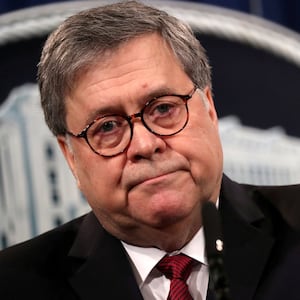I never thought I’d be asking this, but how much Trumpian damage can Attorney General Bill Barr prevent on his way out the door? In one fell swoop on Monday, Barr dealt a major blow to not one—but two—major Trumpian schemes.
With regard to appointing a special counsel to investigate Hunter Biden, Barr said he “would have appointed” a special counsel, if there had been a need. In so doing, Barr “stuck a wooden stake through the heart of the idea,” writes conservative Ed Morrissey. Barr’s comments make it next to impossible for deputy attorney general Jeffrey Rosen to do so (at least, if he cares at all about his reputation). And Barr flatly said there is “no basis right now for seizing machines by the federal government”—a stark rebuke to the advice Trump received from his newly pardoned former national security adviser, Michael Flynn, who’d claimed Trump could do just that. (At the same presser, Barr also sided with Secretary of State Mike Pompeo’s conclusion, which Trump then contested, that Russia was behind recent cyberattacks.)
It’s a remarkable heel-to-face turn from Barr just before the credits roll. From his introduction as a character in the Trump storyline, Barr cast himself as a sycophant. He replaced Jeff Sessions—a Trump true believer whose only weakness was a loyalty to the rule of law that outweighed his otherwise fawning loyalty to Trump. Sessions appropriately recused himself from the Russia investigation; in so doing, he infuriated Trump, who was looking for his own “Roy Cohn.”
Trump thought he had found his fixer in Barr, who was hired after sending an unsolicited memo regarding the unitary executive theory (writing that Trump “alone is the Executive branch”). Once ensconced as AG, Barr’s first major move was issuing a memo to Congress that ostensibly summarized the findings of the Mueller report. (Later we discovered that Robert Mueller felt Barr’s summary “did not fully capture the context, nature, and substance.” But by then, it was too late. The debate had been framed and the impression stamped that the scandal was much ado about nothing.)
Barr’s status as a toady might have implied he would rubber-stamp anything Trump wanted to do—including the attempted coup. But after Trump lost the election, Barr started pumping the brakes. On Dec. 1, contra Trump’s talk of a stolen election, Barr said that “to date, we have not seen fraud on a scale that could have effected a different outcome in the election.” And now, having announced his resignation, Barr is further undermining Trump’s increasingly desperate, if dangerous, machinations.
Some people have suggested that Barr always chooses the weaselly action that will most benefit his personal career ambitions, that he weaseled his way into a job by being a sycophant and turned rat once it became clear that Trump’s attempts to cling to power were doomed.
I don’t buy it. A more generous theory is that Barr is a sincere and passionate defender of executive power, which is to say he believes that Trump (or any president) could fire James Comey, Robert Mueller—whoever they want—and not obstruct justice. It’s certainly possible for an intellectually honest conservative to hold this (albeit controversial and expansive) view and still respect the Constitution, the rule of law, the legitimacy of elections, and the peaceful transfer of power. In this regard, Barr isn’t flipping on Trump—he’s being consistent with regard to his worldview.
This theory happens to dovetail with other recent developments. Last week, in response to all three of Trump’s SCOTUS appointees rejecting Texas Attorney General Ken Paxton’s effort to invalidate elections in four key states, Never Trump conservative writer David French wrote a piece titled, “How the Conservative Legal Movement Stopped Trump’s Attempts to Overturn the Election.” In it, French argued that “the culture, philosophy, and incentives of the conservative legal movement are all aligned against the president.” French concedes that there are plenty of conservative lawyers who do not adhere to this culture or respond to these incentives, but he correctly notes that, “While a member of Congress believes he risks his career if he doesn’t embrace Trump’s conspiracies, a conservative lawyer in private practice risks his professional reputation (and thus his ability to progress through the highest ranks of his profession) if he does.”
When French talks about the conservative legal movement that spawned this culture and these incentives, he is more specifically discussing the Federalist Society—a powerful network of conservative lawyers that helped elevate today's conservative Supreme Court Justices. It’s worth noting that Bill Barr is part of that network (and, you’ll be relieved to know, so is the next attorney general, Jeffrey Rosen).
As a conservative, I have been deeply disappointed in the degree to which Trump has co-opted the movement. But it turns out that the one part of the movement that stood up to Trump when it mattered most was the part that mattered most when the rubber meets the road. In 2016, Donald Trump won the Republican nomination by co-opting conservatives, but his attempts to steal this election are being thwarted by the most elite, intellectual, and (it turns out) principled conservatives in America. Try though Trump might, Bill Barr and the conservative legal community have not let him cross the Rubicon.







